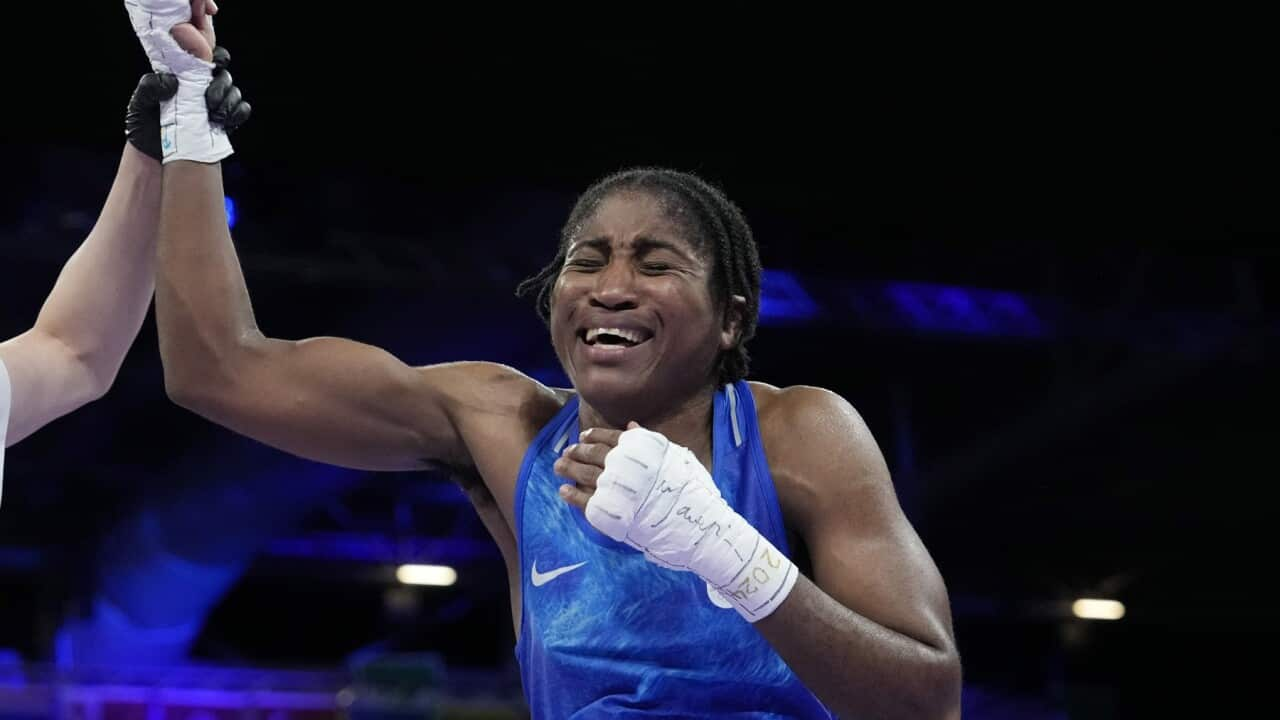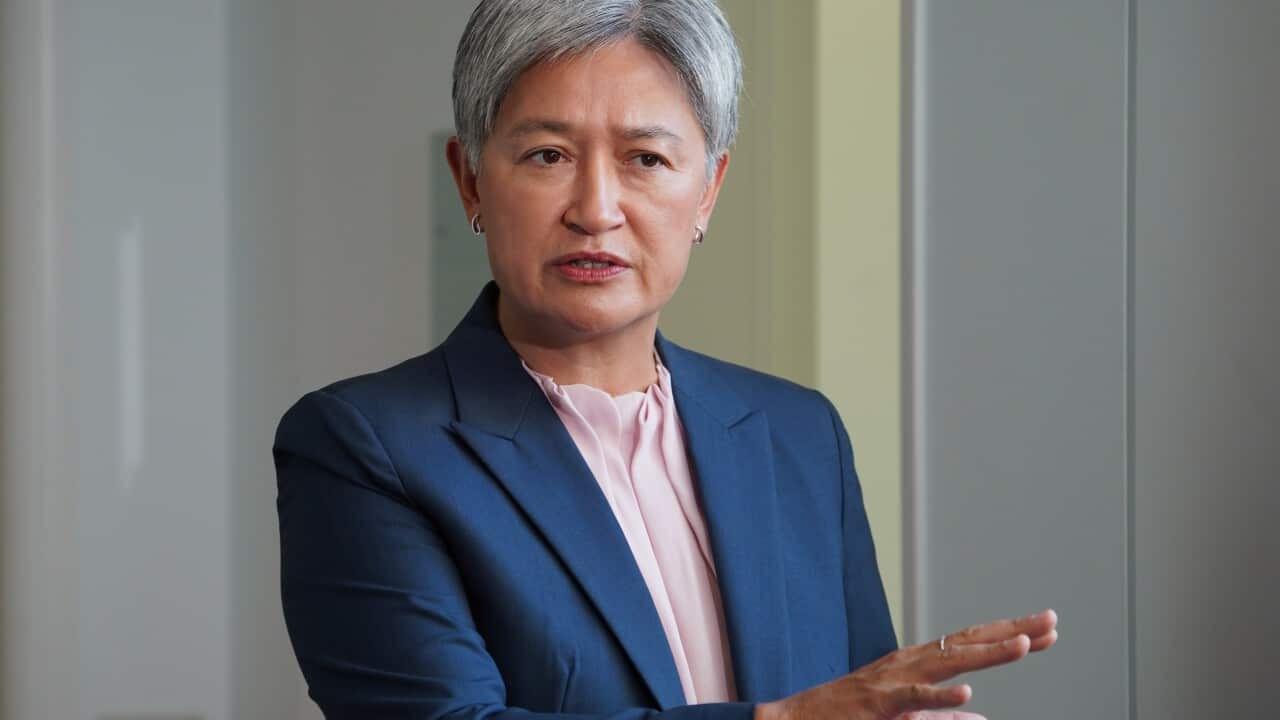TRANSCRIPT
Three rounds, nine minutes - and the Olympic boxing match is over.
But it's an history-making moment for 25-year-old Cindy Ngamba, in her defeat of Davina Michel of France in the quarterfinal 75-kilogram category.
It means she advances to the semi-final - and that she has become the first athlete on the Refugee Olympic Team to win a medal.
She is guaranteed at least a bronze - and possibly a silver or even gold - depending on what happens in the next stage of the competition.
Trudi Mitchell is the CEO of Australia for UNHCR.
She says it is an incredibly uplifting moment.
"In my work every day I have the opportunity to meet refugees - and what I can say is just the talent that they have, whether it's in sport or in what they're studying, and their resilience and their determination, it just comes through time and again. And I think Cindy is showing that as well as a refugee. Give people a chance and it's amazing what they can contribute to their community and to the world."
Getting to the Paris Games as the first-ever refugee boxer to qualify for the Olympics almost didn't happen.
Born in Cameroon, Cindy's sexuality made her target in a country where same-sex relations are criminalised with a prison term of up to five years.
She fled at the age of 11, settling in the town of Bolton in northern England.
It was there that she discovered boxing by chance at her local youth club.
The transition was difficult, Ngamba admitting she was bullied on a regular basis.
Speaking on the Olympics.com podcast, Ngamba says it was a dark time.
"I just try to ignore it, but you can't ignore something because they're just in your face. There's some kid that will literally try to get a reaction out of you. And my reaction was just putting my head down... because I didn't even have the confidence to even try to fight. I got better with feeling comfortable with being uncomfortable. There was nothing I could do about it. I would tell the teacher, they would tell the bully to stop doing what they were doing. But they keep on doing what they were doing. So it was hard. It was very, very hard."
When women's boxing was first introduced to the Olympic program at London 2012, it planted a seed that would become an unshakeable dream to win an Olympic gold medal.
She says her strategy going into the Paris Games was to put absolutely everything on the line.
"I see a lot of refugee out there, all around the world that have so many potential. But they don't have that door for them to be open. I work hard every day and when I think about all the opportunities that's given to me and I don't take anything for granted. And the word refugee means (to me) the potential for people to achieve. And it's a big family. There's different refugees all around the world. When we do meet together, there is no difference - or differences between us. We're all family."
Ngamba's journey to qualifying for the Games was supported by the Olympic Refuge Foundation, with a scholarship for training and participation in high-level competition.
From 74 scholarship recipients, 37 were chosen to join the Refugee Olympic Team - based on their refugee status at the UN, and their elite-level sports performance.
The foundation was created in 2017 to protect and support displaced young people through sport worldwide.
Ms Mitchell says the backstories of the refugee athletes at the Paris Games... provide a unique insight into the experience of refugees - and what they have to overcome after fleeing conflict or persecution.
"Over the last 10 years, the numbers have quadrupled and we are now looking at 120 million people globally who've been forced to flee. And I think this is why the Olympic Committee chose the High Commissioner for UNHCR, Filippo Grandi to accept the Olympic Laurel - and that was on behalf of all refugees. And again, it was a symbol of hope and inspiration to millions of refugees worldwide. And it brings visibility to the challenge faced by refugees."
Also competing at the Paris Games is Australia-based Afghan sprinter Kimia Yousofi.
She fled Kabul, when the Taliban returned to power in August 2021.
And she is one of six athletes on the team representing Afghanistan.
Afghanistan-born Masomah Ali Zada, who fled the country twice before going on to compete as a cyclist in Tokyo 2020 on the Refugee Olympic Team.
She is now the team's chef de mission at the Paris Games.
Ms Zada says she is heartened by the support for Afghan female athletes to compete at the Olympics.
"Yeah, for sure that women, even from refugee Olympic team and three women from Afghanistan team, they're a symbol of hope for all women of Afghanistan. And I have already seen that in the social media. All the people of Afghanistan, they are proud of these courageous women, and they're behind of this woman. And they already say that they are supporting them in their participation in this Olympic games. It means a lot for all the people of Afghanistan, especially for women, and I really appreciate IOC to allow this women to participate and to represent Afghan women."
American-born Palestinian Olympic swimmer Valerie Tarazi says she "couldn't be prouder" to be part of the largest Palestinian delegation to feature at an Olympics.
The 24-year-old says despite the challenges, the athletes have received plenty of messages of encouragement.
She says she views her training - and her participation in the Games - as fighting for her country through sport.
"We've received an immense amount of support, honestly, throughout, even in the village, from fans, from people of Palestine, from my family. I've received more support than I ever thought. Yes, of course we're going to get some hate comments or people on the opposite side of the situation. But we've received so much love and support, and we've used that to fuel our inner fire for competition and everything else. So we're grateful for that."
The IOC established the first Refugee Olympic Team to be a symbol of hope for millions of refugees globally.
This year's team is the largest ever, more than three times bigger than the first Refugee Olympic Team at the Rio Games in 2016.
Displaced from their birth country, the athletes compete under the IOC flag.
French sports minister Amélie Oudéa-Castéra says there is no doubt that the Refugee Olympic Team and refugee athletes have left their mark.
"We are extremely proud of them. I would really like to outline what the IOC is doing for them, the program that has been put together since Rio (Olympics in 2016) to secure that they can participate. They represent courage, determination. They also represent the power of sports and how it can unite people because you can feel here in the air, the admiration of the people. We look at them, they inspire us, they give us the strength and I really want to tell them again how proud we are to welcome them here."













